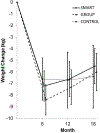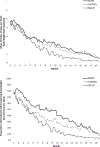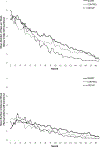Comparison of Smartphone-Based Behavioral Obesity Treatment With Gold Standard Group Treatment and Control: A Randomized Trial
- PMID: 30779333
- PMCID: PMC6430643
- DOI: 10.1002/oby.22410
Comparison of Smartphone-Based Behavioral Obesity Treatment With Gold Standard Group Treatment and Control: A Randomized Trial
Abstract
Objective: This study aimed to determine whether weight losses from a primarily smartphone-based behavioral obesity treatment (SMART) differed from those of a more intensive group-based behavioral obesity treatment (GROUP) and a control condition (CONTROL).
Methods: A total of 276 adults with overweight/obesity were randomly assigned to 18 months of GROUP-based treatment with meetings weekly for 6 months, meetings biweekly for 6 months, and meetings monthly for 6 months and self-monitoring via paper diaries with written feedback; SMART-based treatment with online lessons, self-monitoring, and feedback plus monthly weigh-ins; or a CONTROL condition with self-monitoring via paper diaries with written feedback and monthly weigh-ins.
Results: Among the 276 participants (17% men; 7.2% minority; mean [SD] age: 55.1 [9.9] years; weight: 95.9 [17.0] kg; BMI: 35.2 [5.0] kg/m2 ), 18-month retention was significantly higher in both GROUP (83%) and SMART (81%) compared with CONTROL (66%). Estimated mean (95% CI) weight change over 18 months did not differ across the three conditions: 5.9 kg (95% CI: 4.5-7.4) in GROUP, 5.5 kg (95% CI: 3.9-7.1) in SMART, and 6.4 kg (95% CI: 3.7-9.2) in CONTROL.
Conclusions: Mobile online delivery of behavioral obesity treatment can achieve weight loss outcomes that are at least as good as those obtained via the more intensive gold standard group-based approach.
Trial registration: ClinicalTrials.gov NCT01724632.
© 2019 The Obesity Society.
Conflict of interest statement
Figures




References
Publication types
MeSH terms
Associated data
Grants and funding
LinkOut - more resources
Full Text Sources
Medical

